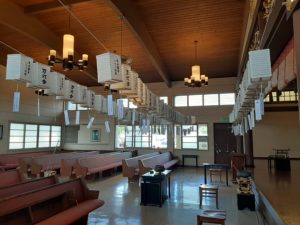
By Rev. Steven Toyoshima
Due to pandemic uncertainty, we’ve all cancelled plans for travel, weddings, funerals and almost any event with other people. Even our annual Bon Dance festivals were cancelled, leaving us feeling that life has turned upside down.
Turning upside down is the focus of the Obon story, which involves one of Shakyamuni Buddha’s most talented disciples and his mother, who had just passed away. Maudgalyāyana (Japanese: Mokuren) also appears in the Meditation Sutra and was renowned for his mental abilities in stories about the Buddha’s sangha.
According to the Ullambana Sutra, Mokuren—after searching for his mother with his paranormal sight—saw that she had fallen into a hell of hungry ghosts. Her kindness and love for him had been at the expense of everything else. Due to this selfish singular love, she ended up in a realm of suffering, likened to being hung upside down (Sanskrit: ullambana).
Like Mokuren’s mother, we’re also faced with situations where we and our loved ones live in a world of suffering and stress. Life sometimes really does feel upside down from where we feel it should be.
The Buddha spoke about four causes of suffering: birth, aging, sickness and death. Included is suffering caused by separation from loved ones and suffering caused by not having our wishes fulfilled. In the Obon story, Mokuren’s mother became a hungry ghost with a bottomless appetite, yet she was unable to eat anything. Isn’t this similar to the dissatisfaction and frustration we feel now in this pandemic?
The Buddha advised Mokuren that he could liberate his mother and other ancestors who were suffering by making offerings to monks of the sangha. To avoid falling into the same trap as his mother, he had to reverse his thinking by helping others around him. The selfless act of preparing a feast for the sangha finally freed his mother from the realm of suffering. Mokuren’s heart filled with joy and he began to dance. This is the origin of the Bon Dance.
Our selfishness causes our own suffering. Our inability to accept the world as it is causes our own suffering. Granted, wanting to escape our troubles is natural. Maybe we don’t want to wear masks or keep apart from people. Following the rules won’t necessarily cure our suffering. Not following the rules most likely will prolong our suffering if the coronavirus spreads due to our selfish ways. We really are living with an upside down feeling.
Buddhism gives us a lens to see the world right side up, allowing us to see Truth beyond our personal discomforts. I’m thinking of how previous generations of immigrants brought Buddhism to America’s shores. They lived in a world perhaps with greater upheaval and difficulties. Their desire for Buddhism to take root in the United States is why today we have temples and the tradition of festivals. While they struggled to survive and take care of their own families, the Buddhist teachings gave them strength and perspective. These past generations passed down to us our temples and traditions, and hopefully, we too can pass them to future generations of Dharma friends.
In these difficult times, we can’t have large gatherings, but we can gather with family and friends via the Internet. We also can cook favorite foods of our parents and grandparents and think about them during this Obon season. In our Jodo Shinshu tradition, we don’t perform rituals or offer food to ancestors in order to send “merit” to them in the afterlife. Rather, the infinite compassion of the Buddhist teachings—represented by Amida Buddha—always embraces us, working to liberate all beings from suffering. With appreciation, we say “Namu Amida Butsu” (I take refuge in the Buddha of Infinite Life and Light).
This year has been strange. Causes and conditions come together to create an uncertain world where life feels upside down. Through the workings of the compassionate dharma, reflected in the lives of our loved ones, we’ve been given a blueprint for seeing the world clearly, allowing us to live right side up.
-Rev. Toyoshima is a minister at Higashi Hongwanji Mission of Hawaii in Honolulu.

